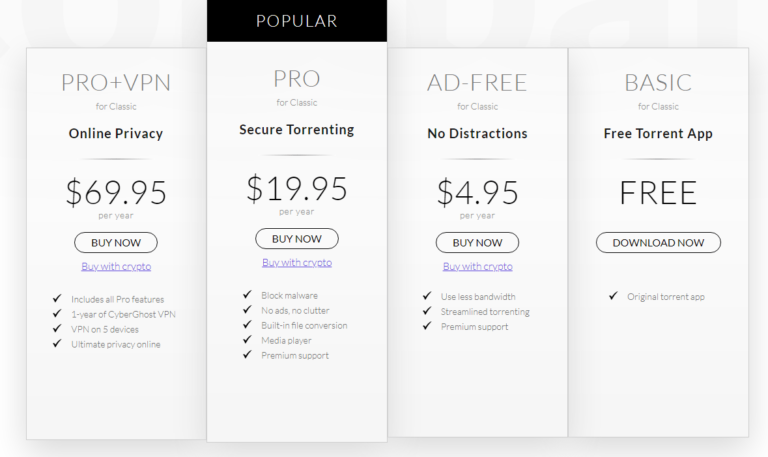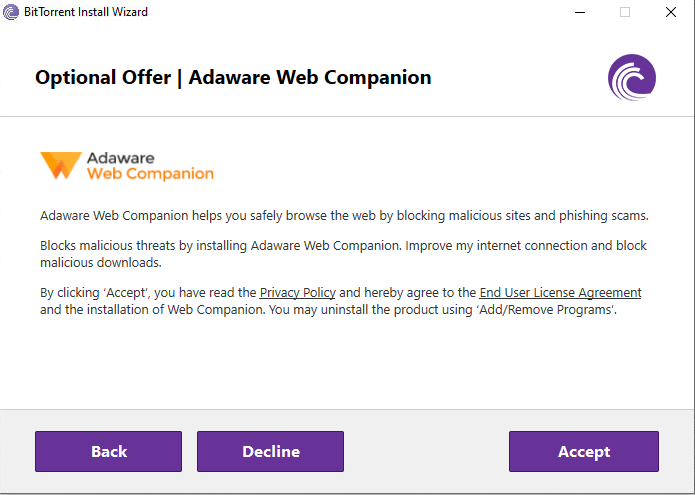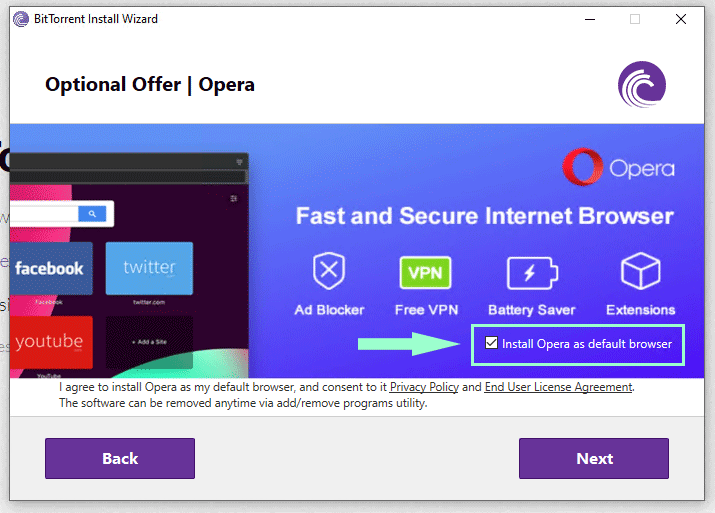Your torrent client is an essential part of your bittorrent experience. And choosing the right torrent client can have a big impact things like: torrent speed, privacy, peer availability and more.
In this article, we’ll compare two popular bittorrent clients: qBittorrent vs BitTorrent.
The core functionality of most torrent clients is pretty similar, but there are a number of key differences between these to clients.
In our testing, there was one clear winner.
What we’ll cover:
We’ll take a comprehensive look at the differences between qBittorrent and BitTorrent.
This article covers:
- Installation & Bloatware
- Design & UI
- Features & Functionality
- Security & Privacy
- Speed Testing
- Mobile / OS Support
- Conclusion
Quick Comparison
 BitTorrent BitTorrent |  qBitTorrent qBitTorrent | |
|---|---|---|
| Magnet Links | Yes | Yes |
| RSS Feeds | Yes | Yes |
| DHT | Yes | Yes |
| PEX | Yes | Yes |
| uTP | Yes | Yes |
| IP Filter / Firewall | Yes | Yes |
| IPv6 Support | Yes | Yes |
| Proxy Support | SOCKS/HTTP | SOCKS/HTTP |
| VPN Binding | Yes | |
| Auto-Configuration | Yes | |
| Custom Search | Yes | |
| Source Code | Closed | Open-Source |
| Bloatware | No | |
| Ads | No |
Installation
qBittorrent Installation
Locating the download link for qBittorrent is quick and easy. There’s a download section displayed prominently on the top navigation bar at qbittorrent.org.
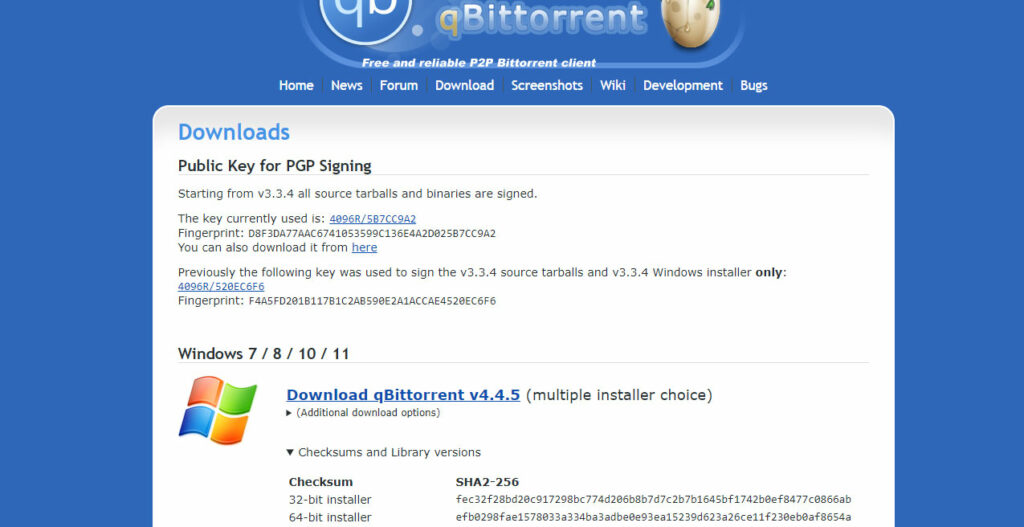
The download page lists the current version for each operating system, as well as the SHA-256 checksum so you can verify the integrity of the downloaded file (if you’re the suspicious type).
The only confusing part is that the downloads themselves are hosted at FOSSHUB, so the download link opens a different website entirely, without warning that you will be redirected. Don’t worry, however, FOSSHUB is a reputable site and long-standing repo for open-source software like qBittorrent.
Once you download qBittorrent, you will (thankfully) find no malware, adware, or extra junk bundled with qBittorrent. Installation is quick and easy once you’ve downloaded the installation file.
BitTorrent Installation
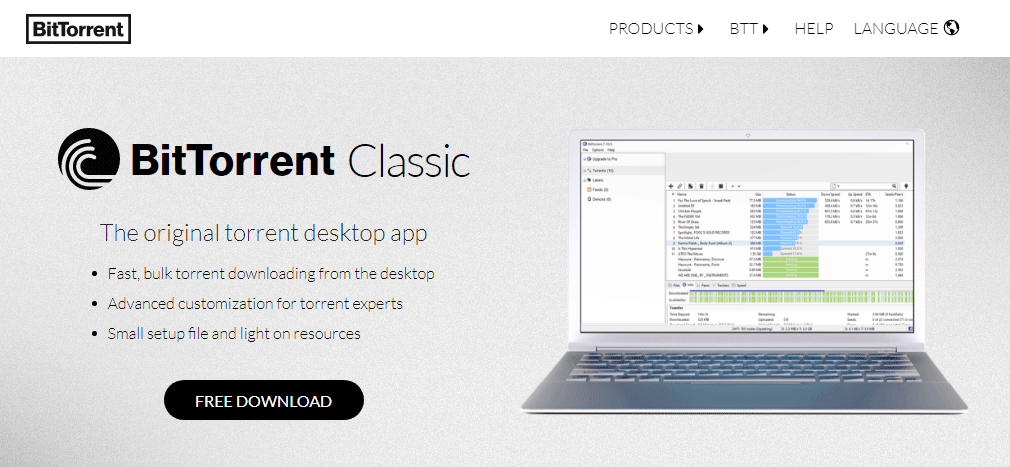
Being a for-profit company, Bittorrent’s installation is a bit more streamlined but also highly commercialized. Once you navigate to the ‘Bittorrent Classic’ page (the desktop software) you’ll be upsold the option for a pro (ad-free) version.
After clicking ‘free download’ there is also an interstitial upselling VPN service. We highly recommend using a VPN when torrenting, these are our top picks.
During the installation dialogue, I was prompted to install not one, but two pieces of bundled software. The second was especially tricky, which featured no ‘decline’ button and would install Opera as your default browser if you don’t uncheck the tiny checkbox.
It’s clear what they’re trying to do here. Negative points for sneakiness.
After dodging the bloatware, the install proceeded smoothly and I chose the default options the rest of the way.
Upon launching the program for the first time, I was greeted by yet another offer, allowing me to let strangers store encrypted files on my spare hard drive space in exchange for cryptocurrency tokens. No thanks.
UI & Design
In terms of design, both pieces of software are extremely similar.
Each has a menu bar at the top, a navigation pane on the left, and a larger main window where you manage your active, pending, and completed torrents. Here you can also see specific details about your current torrents including:
- peer availability
- download/upload speed
- Pieces downloaded
- and so on…
BitTorrent Desktop UI (Windows)
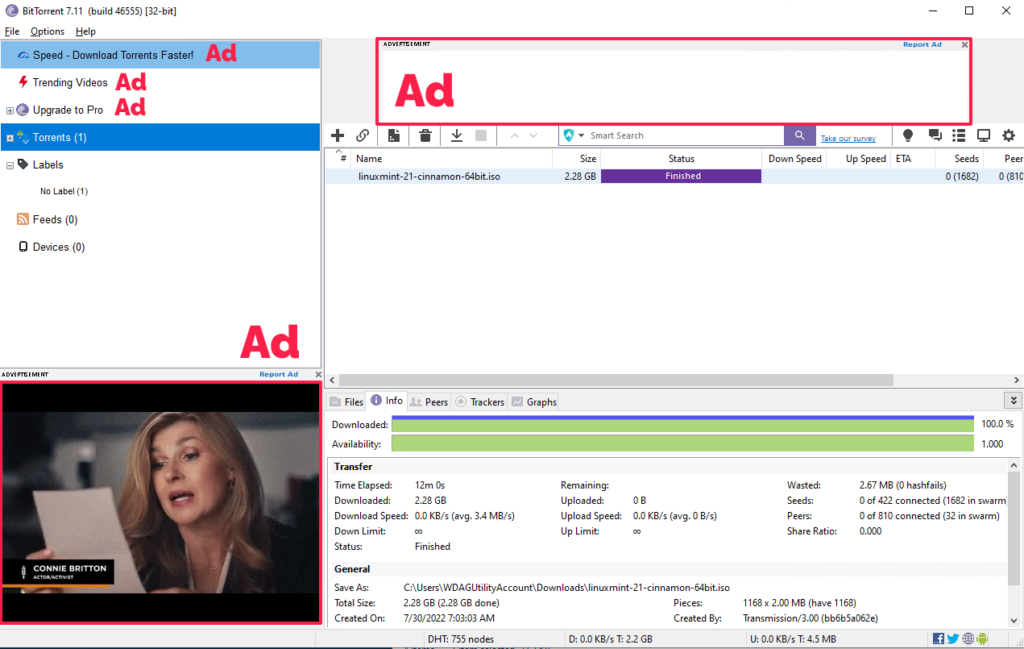
qBittorrent Desktop UI
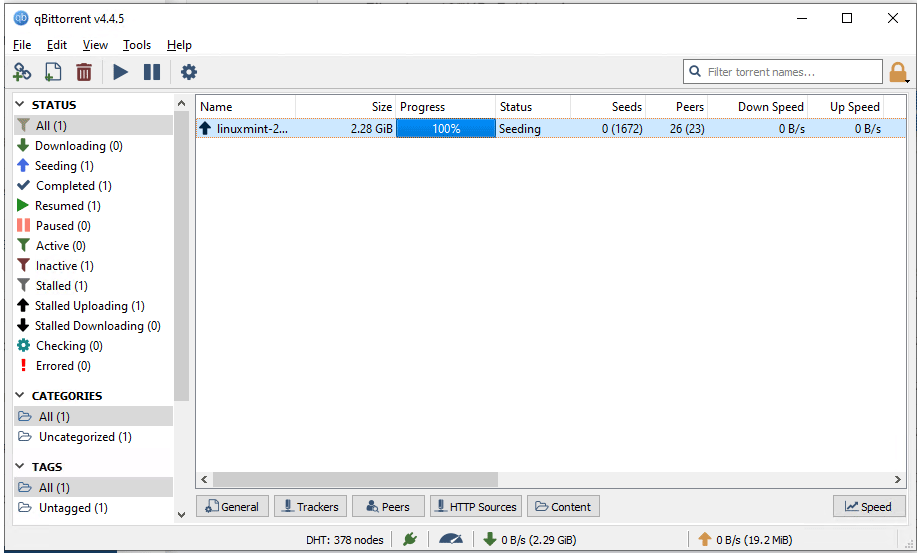
There are a couple notable differences in their respective UI’s, however:
- Ads – Bittorrent has a large section at the bottom of the left navigation pane which rotates through a series of ads (many of which feature VPN services or crypto-related offers). qBittorrent has no ads.
- Other Commercialization – Also in the left pane, Bittorrent has a link to their pro-upgrade offer, a monetized ‘trending videos’ section, and a prominent ‘Speed’ section which is yet another attempt to get you to use their BTT cryptocurrency token.
Bottom Line: qBittorrent’s interface is cleaner, has no ads, upgrade nags, or weird cryptocurrency offers. While the design is perhaps a touch less modern than Bittorrent’s, it’s still much nicer to use thanks to the lack of distractions.
Features & Functionality
As far as popular features go, these clients are practically identical. So it’s no wonder that they’re two of the most popular bittorrent clients.
For example, both clients support:
- Magnet links
- RSS Feed support
- Bandwidth optimization
- Peer Exchange & DHT (tracker-less torrents)
- Torrent prioritization
- Sequential downloading (download torrent file pieces in order)
- Proxying of tracker/peer communication (for privacy)
- uPnP and Port Forwarding
- µTP bandwidth optimization
- Firewall & IP filtering (e.g. peerguardian)
- Remote management (via app or web)
- Most major platforms & OS (not iOS)
But as I dive deeper into both these apps, each has a handful of unique features that the other doesn’t offer.
Unique Features of BitTorrent
Aside from the blatant attempt to monetize and push the (BTT) crypto token, BitTorrent does have a few actually useful, unique features.
File Management
The file management interface in BitTorrent is a bit more polished compared to qBittorrent. In addition, you can change the file structure of active torrents, something you cannot do with qBit.
Self-Configuration & Optimization
BitTorrent has a built-in bandwidth optimizer that will run a test on your network and attempt to auto-decide the optimal settings for your device. For example, here are the settings it choice for me:
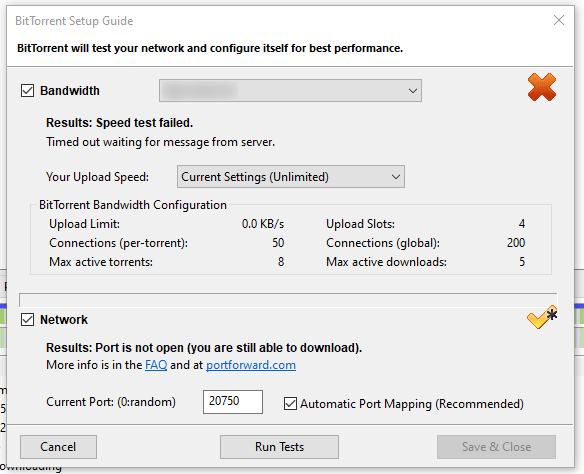
Unique Features of qBittorrent
Here are the features that set qBittorrent apart. If any of them are important to you, it should make your decision rather easy.
Integrated search engine
The built-in search can help you locate torrent files. You can even configure it to search your favorite torrent sites by copying the search URL structure to qBittorrent. This works for both legal and non-legal sources (e.g. The Pirate Bay)
Kill Switch
If you use a VPN or proxy for privacy, then it’s a good idea to use the built-in kill-switch feature in qBittorrent. To set this up, you simply bind qBittorrent’s network interface to the VPN connection. If it fails, qBittorrent will disconnect your internet traffic immediately.
This prevents other bittorrent users from seeing your real IP address or location. It is highly recommended and a nice feature that you can’t currently get in the BitTorrent client.
Security & Privacy
Both programs are generally secure and stable, but not equally so. Each has its own potential vulnerabilities.
Bittorrent security issues
Being closed-source proprietary software, the Bittorrent client’s code can’t be inspected by security researchers, meaning their may be unpatched vulnerabilites that persist for years.
Additionally, the fact that the client displays ads creates a potential for malicious code injection or phishing site redirects that are a non-issue in qBittorrent.
qBittorrent security issues
Because qBittorrent is open-source, both hackers and researchers can inspect the code. This makes it easier for hackers to find vulnerabilities (if they exist) but also for researchers to find them before bad-actors do. On average, popular open-source software tends to have fewer critical vulnerabilities than close-source but that is no guarantee.
On the other hand, there’s no adware, bloatware, or phishing risks with qBittorrent, so that’s a huge leg up.
Other Privacy Features
Most torrent users use a vpn, proxy or other privacy method when downloading torrents. Both of these clients fully support proxied peer and tracker communication (SOCKS proxy recommended). VPN usage is also 100% supported (no configuration required).
Additionally, each lets you configure an IP-based firewall using blocklists such as peerguardian (though we wouldn’t bother).
Finally, there’s i2p which is like a slower version of Tor, and suitable for torrenting (if you really, really don’t care about speed).
Speed & Performance
Surprisingly, performance was very different when comparing qBittorrent to BitTorrent.
For our test, we downloaded the exact 2.28GB same test torrent, using the same device and internet connection to measure real-world download speeds.
Here are the results:
BitTorrent:

- Time: 11m 26s
- Peek Peers: 31
- Average Download Speed: 3.32Mb/s
qBittorrent:

- Time: 9m 46s
- Peek Peers: 84
- Average download speed: 3.89 Mb/s
By my calculation, that makes qBittorrent 16.6% faster then BitTorrent– a significant improvement.
Mobile Apps
So far, we’ve been looking exclusively at the desktop client for each of these popular torrent clients. But what about mobile?
Well first off, there are no torrent apps in the official iOS store, so iPhone is out of the running.
BitTorrent Mobile
As far as Android goes, BitTorrent is cross-platform and there is an BitTorrent mobile version, though it has significantly fewer features than the desktop version. Notably absent is proxy support.
It will still work with a mobile VPN, however. BitTorrent mobile is good enough in a pinch, but I highly prefer the desktop version at home.
qBittorrent Mobile
Unlike BitTorrent, there is no qBittorrent app in the Google Play store. There is, however, a qBittorrent remote app. This is like a remote control that lets you manage your desktop client from home. It’s available in both a free and premium version.
For most users, we actually recommend Flud as our preferred standalone torrent client on Android, as it’s the clear leader in features & performance.
Conclusion: which is better?
In my view, there’s a clear winner here.
Winner: It’s qBittorrent.
qBittorrent matches BitTorrent nearly feature-for-feature, while adding some valuable functionality of its own including: VPN binding and in-client torrent search.
While the UI might not be quite as pretty, it’s ad-free and you don’t have to worry about malicious JavaScript, crypto miners, or bundled garbage during your install.
And if that isn’t enough, our speed testing shows that qBittorrent’s lightweight codebase has real-world performance benefits.
Personally, qBittorrent is my go-to client and I would never trade it for a recent BitTorrent version. It’s too bloated, commercialized and slow.
Which client do you prefer, and why? Let us know below!
NEXT — Make sure your Favorite Torrent Software is Configured properly:
These are our in-depth configuration guides for the most popular torrent clients:
